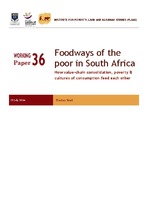Foodways of the poor in South Africa: How value-chain consolidation, poverty & cultures of consumption feed each other
Abstract
South African food systems are in a dynamic process of transition due to changes in food value chain
regimes which have major impacts on the poor. However, these transitions are also shaped by demandside
drivers emerging from the 'foodways of the poor' - the ways poor people access food, what kinds of
food they purchase, how they are consumed, and the culturally-conditioned meanings ascribed to food
and eating. To explore these demand-side influences, this paper first considers contrasting current
understandings of what poverty is, and who and where the poor are in South Africa. The paper then
considers recent research findings that cast light on what poor people eat and where they get food, and
how this contrasts with the foodways of better-off people. The emerging patterns – a predilection for
cheap grain staples, sugar, soft drinks and chicken frequently sourced through informal channels -
suggest that, next to structural determinants such as price and convenience, the symbolic and aspirational
domain of food aesthetics and the social functions of visible consumption as symbols of wealth are key
forces shaping the foodways of the poor. The provisioning strategies and preferences of the poor – about
half of the South African population - emerge as powerful forces rippling back up value chains, and
contributing to key trends in the food system such as consolidating and concentrating core value chains
such as maize, wheat, poultry and dairy, with social, environmental and health impacts. In contrast to a
top-down cascade imposing poverty and hunger, this perspective suggests complex feedback loops
between the upstream nodes of food value chains, and the culturally conditioned agency of the poor. This
exploration highlights a paucity of research on the links between the foodways of poor people and other
aspects of the food system, including poverty narratives, food geographies, informality, and feedback
loops in specific value chains. Innovative and trans-disciplinary research approaches and inclusive
frameworks are needed to address knowledge gaps and inform transitions towards more transparent and
equitable food systems.

